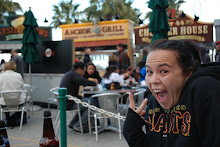The Kite Runner
“La illaha il allah, Muhammad u rasul ullah,” a phrase not heard or spoken since Amir’s childhood, but when the son of his childhood friend is dying, he finds himself kneeling with his head on the ground almost thirty years later looking to his God for answers--for help. The Kite Runner by Khaled Hosseini is a story of a boy born and raised in Afghanistan who flees to America with his father when wars begin to rage in his homeland. The story is taken through the important steps of youth in Afghanistan in the ‘70s, through escape from war ridden land, and the struggle to be true to oneself and ones culture in a new land and the struggle to go back home to save yourself. The Kite Runner brings an entirely different view of Afghanistan into the readers mind, but in the wake of September 11, 2001, is its purpose to influence the reader’s opinion of Afghanistan and its people? Propaganda, according to the Merriam-Webster Online Dictionary, is “the spreading of ideas, information, or rumors for the purpose of helping or injuring an institution, a cause, or a person.” Now assuming this is a universal definition, it would be my disposition to say that The Kite Runner is not propaganda and I am not quite sure that I could understand how anyone could consider it to be.
The Kite Runner is a book, that although written to tell a story of life in another country, is not meant to persuade the reader’s opinion of the country. The book tells a story of how life was, how it is, and how it has changed over the years. Just like in America, there are times when everyone was happy, and life was good and there are also times that were not so good. Amir’s life in Afghanistan was great, although he struggled to please his father, he had a good life. He had a good friend and he had his family. The story that is told in The Kite Runner is one of life.
Propaganda, to me, is more of an ad. It is something that tells you what to think. Propaganda is something that makes you think that a certain product, thought, or concept is better than what someone is already thinking. But who is to say that anyone is right? A story of life and of love, is not a book of persuasion, it is a book of reality. The Kite Runner shows its readers that there is life in other countries, it may not be as glamorous as life seems here, but it does exist and it is necessary to open our eyes to it. This book does just that, it opens our eyes to what is already there.
With the story that is told, it is up to the reader to interpret what is being said. It is in my interpretation that I have found the book to be moving and touching, but not to persuade any opinion that I have already formed of Afghanistan. Before reading this book I knew very little of Afghanistan and now after reading the book, I know the same. Afghanistan is a country that although there are many who have money, there are even more that do not. It is a country that has its own problems.
A book of this caliber is moving and it captivates an audience. Although I do not view this book as propaganda, I do understand why it could be considered as such. It tells a story of a world most of its readers do not understand. A world in which little boys get raped by other little boys, a world where fleeing seems to be the only way to survive, and a world in which an orphanage is even more dangerous than the streets. It would seem based on these ideas that the story of The Kite Runner is propaganda, but after careful consideration I have determined that the book was not intended to change the reader’s opinion of Afghanistan, only to open the reader’s eyes.
When considering the story, the reader must see that there are terrible things that go on in Afghanistan, both decades ago and in recent times, but it must be realized that things like this occur everywhere. Not to say it is any less terrible, but it does occur. Anyone could write a story about America and tell almost the exact same story, it does not matter where the story is set, it can happen anywhere. It just happens to be set in Afghanistan. Many people who read books, read them to get away from the reality that is life, we read to escape the world we are currently and divulge ourselves in a world that is far beyond and inescapable. Finding ourselves in the Amir’s life is an experience that someone can never forget, because it was often difficult to put his life story down. He takes us on a journey through his young childhood to mid-adulthood, where he finds himself happy for the first time in nearly 25 years. He is definitely a character, but unlike a character in an ad, or maybe like a character in an ad, I think we know better than to let a book persuade us in such a way to completely change our opinions of what we know.








